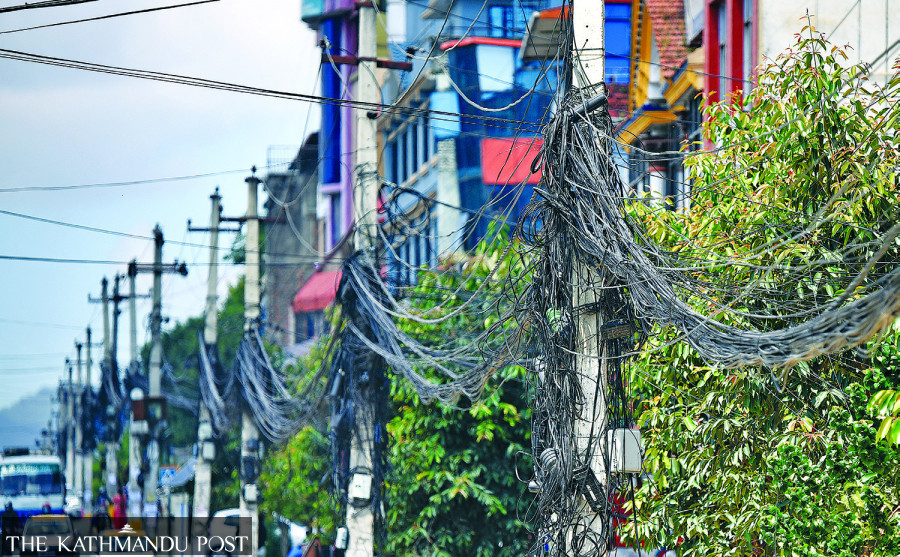Money
Telecom regulator tells service providers to sign rent agreement with power utility
The Nepal Electricity Authority and internet service providers have been haggling over the rent for using the poles for years.
Krishana Prasain
Nepal’s telecom regulator has asked all telephone, cable TV and internet companies to sign an agreement with the Nepal Electricity Authority for the use of its utility poles to support their cable wires after a longstanding dispute over unpaid rent led to the state-owned power utility's removing the wires last month.
The Nepal Telecommunications Authority published a notice on Wednesday asking service providers to self-declare the location, number and type of the infrastructure and the duration of use, particularly the poles they have been using, and sign a formal contract by mid-November.
The power utility and service providers have been haggling over the rent for using the poles for years. They have not made any formal agreement as of date.
Achyuta Nand Mishra, deputy director of the Nepal Telecommunications Authority, told the Post that a meeting held at the Ministry of Energy on October 3 decided to make service providers use the poles in a legal way, by paying fees.
“The service providers have been given a November 16 deadline to complete the agreement,” he said.
A committee has also been formed in coordination with the minister for communication, information and technology that includes representatives from the Ministry of Energy, Nepal Telecommunications Authority and Nepal Electricity Authority to settle the row by fixing the rent for using the poles.
The panel has been given a mid-November deadline to submit a report.
“As per the report, we will make a long-term arrangement,” Mishra said.
On October 2, the telecommunications regulating body criticised the Nepal Electricity Authority for cutting the internet cables of customers after the service providers failed to pay the rent for the poles by the deadline it had set.
The power utility had warned the service providers they would have to face the consequences if they did not pay the rent for the poles by October 1.
The state-owned power utility had issued the notice on September 14. The service providers did not pay heed to the warning, and the consumers had to suffer lost connections.
The power utility cut the internet and cable wires at nearly a dozen places across the country which attracted condemnation from all over since the internet has been specified as an essential service.
The Nepal Electricity Authority said it cut the internet cables as a “symbolic” move to make service providers understand the consequences of not paying the rent.
The country's internet companies have been saying that if they are made to pay the increased rent for using the poles, the burden of the extra expense will have to be passed on to the customer.
They have also sought permission from the Nepal Telecommunications Authority to increase their charges for internet access. But the telecommunications authority has said that the internet price should not be increased and they are holding discussions with the government to resolve the issue.
As per the new rent structure, service providers have to pay an annual rent of Rs14,000 (excluding tax) per kilometre for using the power utility's 33 and 11 kV poles.
To install optical fibre on an electric distribution pole of 33 or 11 kV or less, service providers need to pay Rs9,000 and Rs7,000 per kilometre annually in metropolitan cities and municipalities or rural municipalities, respectively.
The Nepal Electricity Authority said that the snarls of wires on utility poles left the service providers had destroyed the beauty of the city, and if they used 96 core fibre optic cable wires, a system to allow sharing, it would be cheaper for them and also help bring down internet costs.
According to the Nepal Electricity Authority, 95 percent of the cable wires on the poles were not usable, and many old poles are about to fall due to the weight of the tangled wires.
The government on May 28 listed the internet as an essential service.
Sudhir Parajuli, president of the Internet Service Providers’ Association Nepal, told the Post that they were ready to abide by the government's decision. “We will sign the agreement as per the stipulated deadline. However, we will pay the rent based on the committee's report.”
As of mid-August this year, there were 40.28 million voice telephone subscribers and 32.19 million internet users, as per the report of the Nepal Telecommunications Authority.




 20.12°C Kathmandu
20.12°C Kathmandu














